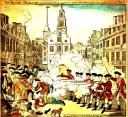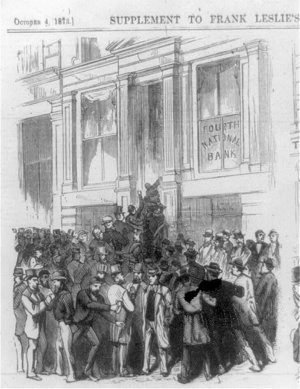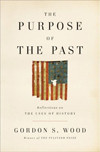Professor Randy Pausch (1960-2008) passed yesterday, and in honor of his life I post his “Last Lecture” video:
Former NASA Astronaut Claims extra-terrestrials have visited Earth…
FORMER NASA astronaut and moon-walker Dr Edgar Mitchell – a veteran of the Apollo 14 mission – has stunningly claimed aliens exist.
And he says extra-terrestrials have visited Earth on several occasions – but the alien contact has been repeatedly covered up by governments for six decades.
Dr Mitchell, 77, said during a radio interview that sources at the space agency who had had contact with aliens described the beings as ‘little people who look strange to us.’
He said supposedly real-life ET’s were similar to the traditional image of a small frame, large eyes and head.
Chillingly, he claimed our technology is “not nearly as sophisticated” as theirs and “had they been hostile”, he warned “we would be been gone by now”.
What was the American Revolution about?
 According to this MSN Encarta listing, the American Revolution was nothing more than “Colonial elites,” landholders and plantation masters, continuing their “rule at home,” but without outside interference. From there, the pursuit of “life, liberty, and property” still excluded, “White women” and “most white men without property,” and of course not to mention Native Americans and African American slaves. Hence, the implication is clear.
According to this MSN Encarta listing, the American Revolution was nothing more than “Colonial elites,” landholders and plantation masters, continuing their “rule at home,” but without outside interference. From there, the pursuit of “life, liberty, and property” still excluded, “White women” and “most white men without property,” and of course not to mention Native Americans and African American slaves. Hence, the implication is clear.
The above seems to suggest that the American Revolution was about nothing more than local elites tightening their grip on the lower-classes, the poor. Women, of course, were still second class citizens, and we cannot forget the irony of slavery and the so-called “egalitarian” American pledge. There was no redistribution of wealth, no equality for all, and if anything the gap between rich and poor increased.
According to historian Carl Becker (1873–1945), the Revolution was not just about “home rule” it was about “who” was to rule at home. Gordon S. Wood calls it the “most important” event in our nations history as it legally formed the union, but more importantly it “infused into our culture all of our noblest beliefs and ideals, in truth, all of what actually makes us a union.” Americans knew what they had accomplished and the freedom they had gained. When compared to Europe, where no one got a vote regardless of white men or black men, the foundation was laid for the greatest and longest lasting constitutional government, based on republican principles, ever established.
So two interpretations here: 1) Conservative, where the event is seen as really nothing to get excited about, and didn’t do enough to equalize women and slaves; 2) Radical, where the revolution is seen as an event that restructured American culture and society, and for the better, and set the groundwork for women suffrage and even black freedom. (Because we created a constitution that could be amended, and because the ideas were in place for true equality for everyone.)
Historians such as Howard Zinn and Gary B. Nash would be more in the #1 category, and would probably agree that the Revolution was nothing more than about “home rule” and colonial elites tightening their reigns on the lower-class America, ect.
Gordon S. Wood and probably Edmund S. Morgan, both, I think it fair to say would be in the #2 category. I know, going out on a limb here.
The Revolution was both destructive and constructive, Loyalists fled by the thousands leaving behind land and wealth. Property had been damaged and destroyed. The United States was bankrupt and had no credit. An entire government structure had been swept away, and a new one put in its place, and slavery was legally protected.
I think within this is a great opportunity to challenge students to decide, on their own, through research, the following question, Was the American Revolution “Conservative” or “Radical” in its nature and outcome? Lots of arguments on both sides.
Based on my own reading and research I have a very clear view of the Revolution and will expand on that in another post.
Also, I second Kevin’s comments concerning HBO’s miniseries “John Adams,” I am two episodes into it and am also enjoying it. Though I would have liked a couple of changes, I overall feel it is a well-done production and once again shows why HBO does probably the best job with historically based movies; e.g. “Band of Brothers.” They produce a motion picture (movie) quality production with great sets and good actors.
The Panic of 2008?
 The current mortgage crisis and congressional buyout schemes point to the larger issue of fiscal irresponsibility on the part of big banking. I think the result is probably our own “Panic of 2008?”
The current mortgage crisis and congressional buyout schemes point to the larger issue of fiscal irresponsibility on the part of big banking. I think the result is probably our own “Panic of 2008?”
How many economic “panics” have been a direct result of bad practices by big banking? Let’s see: the Panic of 1873 and the Panic of 1907 come to mind (have to admit not sure if the reasons were “bad practices”), and others come to mind (1857) but were they a direct result of big banking? In 1857 banks put a lot of speculation into businesses that started to fail, but were these practices irresponsible? Most likely they were ill-advised and the product of greed.
Looking through Wiki, I see that in 1873 things got so bad that fires sprang up in cities without the means to deal with them, and so they burnt uncontrollably. Coal could not be delivered to Trains, and transportation networks failed in some parts of the country. The U.S. Army was fighting the Apaches on foot (horses were breaking down and without replacements). Wagons hand to be pulled by hand, cargo filled trains and ships sat unloaded, and deliveries of basic things like food came virtually to a halt. There are those who might argue that if we do not do something about our energy supply, maybe, we see similar things in 5 years, maybe sooner?
——-
Don’t look now, but there is a possibility of a new Cuban Missile Crisis with Russian apparently planning to fly long-range bombers to Cuba on a regular basis. “If they did I think we should stand strong and indicate that is something that crosses a threshold, crosses a red line for the United States of America,” said General Norton Schwartz, nominated to be the air force’s chief of staff.
Finally, the New York Times is in serious trouble as it was recently reported that their second-quarter earnings fell 82 percent from the year-ago, dropping its net income to $21.1 million.
Too Bad No One Listened Or Acted…
 After his failed Beer Hall Putsch (1923), Adolf Hitler was arrested on November 11 and soon after found guilty of high treason and sentenced to five years imprisonment. The term would be reduced, but nonetheless he hand some time on his hands. So what did he do? He wrote a manifesto outlining exactly what he hoped to achieve… too bad no one read it and those that did, did not believe the little crazy guy from Austria was a threat. Germany was practically a third world country after the ravages of war (WWI), and Hitler and his Nazis just a radical expression of desperation. The world ignored him. But within 10 years the National Socialist Party controlled Germany, and Europe’s fate was sealed. The result of his imprisonment was his book, Mein Kampf (“My Struggle”) and was published on July 18, 1925 (that’s today, 83 years ago). I have looked at an original 1925 copy and frankly, though it is in German and I could not read it, it brought a cold chill down my spine.
After his failed Beer Hall Putsch (1923), Adolf Hitler was arrested on November 11 and soon after found guilty of high treason and sentenced to five years imprisonment. The term would be reduced, but nonetheless he hand some time on his hands. So what did he do? He wrote a manifesto outlining exactly what he hoped to achieve… too bad no one read it and those that did, did not believe the little crazy guy from Austria was a threat. Germany was practically a third world country after the ravages of war (WWI), and Hitler and his Nazis just a radical expression of desperation. The world ignored him. But within 10 years the National Socialist Party controlled Germany, and Europe’s fate was sealed. The result of his imprisonment was his book, Mein Kampf (“My Struggle”) and was published on July 18, 1925 (that’s today, 83 years ago). I have looked at an original 1925 copy and frankly, though it is in German and I could not read it, it brought a cold chill down my spine.
We need to use the Way Back Machine and put poor Adolf out of his misery in 1925…
‘Bushonian America’ just Doesn’t have the same Ring to it as ‘Jacksonian’
I’ve been spending a lot of time reading Daniel Walker Howe’s What Hath God Wrought: The Transformation of America, 1815-1848. This book is another outstanding contribution to the Oxford History of the United States series. Howe’s work might be the best of the bunch so far, I don’t know.
 Anyway, his handling of Andrew Jackson and his legacy has really been interesting and thought provoking. Howe avoided using terms such as “Jacksonian America” and he did so as Jackson was a very controversial figure who tended to divide American, which, for example, was in staunch contrast to Monroe who was pretty much the opposite. To call this era as being “Jacksonian” is probably not historically accurate.
Anyway, his handling of Andrew Jackson and his legacy has really been interesting and thought provoking. Howe avoided using terms such as “Jacksonian America” and he did so as Jackson was a very controversial figure who tended to divide American, which, for example, was in staunch contrast to Monroe who was pretty much the opposite. To call this era as being “Jacksonian” is probably not historically accurate.
So how do you teach Jackson? I have to admit, part of me really finds a no-nonsense president who had actually fought in a battle (and killed) kinda appealing considering the ilk we get today.
Jackson’s era was complicated, crazy, and incredibly American. It was a time of lots of things, both good and bad: massive expansion, technological and transportation revolutions, and of course, slavery.
Interestingly, I see a lot of similarities with Jackson and President George W. Bush. Though even if future historians are tempted, I hope they don’t label us “Bushonian,” Gawd (wink) that would be horrificationally (wink) bad.
However, looking at the two, the similarities are interesting. Both won by running as “outsiders.” Though Jackson won the popular vote decidedly, Bush did not.
But continuing, both had presidency’s that were decidedly divisive, polarizing, and highly scrutinized. Jackson seemed to have created the Democratic party by dismantling its predecessor, and the Bush presidency has probably seriously altered the Republican party.
From the polarizing effects of Jackson and his opposition emerged two parties: the Democratic Republicans, or Democrats, adhering to Jackson; and the National Republicans, or Whigs, opposing him. Both evolving from the old Republican Party. Today, the Republican party might very well be undone after Bush is gone as well. There are already ramifications.
Both were criticized and saw members of their party abandon them because of their policies, and both are seen as cowboys or westerners.
Jackson, an unapologetic racist and white supremest (much like most whites of his time). Bush, rightly or wrongly, was not beloved by such groups as the NAACP and La Raza.
Bush will probably be remember as a gunslinger or warmonger, or something of sort. Jackson had killed and was always up for a duel.
And as the election comes around, something else to note, when Van Buren succeeded Jackson as a candidate, it was described as “Jackson’s Third Term,” and today political opponents are calling McCain, “Bush’s Third Term,” as well.
This is not a “political” post but an observation. I take no sides, express no ideological belief, but only seek to find some kind of “historical sense” within the here and now, as well as the past. So please, do not enter comments blasting Bush or anyone else, they will be deleted. If you wish to make an intelligent observation, please do!!
The Purpose of the Past: Reflections on the Uses of History
 Gordon S. Wood is the Alva O. Way University Professor and professor of history at Brown University. He is the author of many award-winning works, including The Creation of the American Republic, 1776-1787, which won the Bancroft and John H. Dunning prizes and was nominated for the National Book Award; The Radicalism of the American Revolution, awarded the Pulitzer Prize and the Emerson Prize.
Gordon S. Wood is the Alva O. Way University Professor and professor of history at Brown University. He is the author of many award-winning works, including The Creation of the American Republic, 1776-1787, which won the Bancroft and John H. Dunning prizes and was nominated for the National Book Award; The Radicalism of the American Revolution, awarded the Pulitzer Prize and the Emerson Prize.
Now comes his newest book, The Purpose of the Past, which is a collection of long-form book reviews Wood’s wrote during the past 25 years for the New York Review of Books and the New Republic. The book holds together nicely thematically, which can be an issue with a book of “reviews.” However, as you’ll see there is a consistent element to the tone of the book which starts with Wood’s review of Garry Wills’ Explaining America (1981) and ends with his thoughts on Robin L. Einhorn’s American Taxation, American Slavery (2006). What also makes The Purpose of the Past worthy of purchase is that Wood offers an “Afterward” with new insights or thoughts since the publication of the review he wrote.
 A fellow reviewer offered this description of the book: “The Purpose of the Past is not another crotchety elegy for what history once was but sadly now isn’t; it is also a celebration of what, at its best, it is, and a powerful argument for its ongoing necessity,” and I could not agree more.
A fellow reviewer offered this description of the book: “The Purpose of the Past is not another crotchety elegy for what history once was but sadly now isn’t; it is also a celebration of what, at its best, it is, and a powerful argument for its ongoing necessity,” and I could not agree more.
In her book, Mothers of Invention: Women of the Slaveholding South in the American Civil War, historian Drew Faust hoped to offer “a sense of how people are shaped and constrained by the world into which they are born, of how their choices are limited by the ‘taken for grantedness’ of their social universe.” Faust wanted to show “how people managed not just to accept, but to justify social arrangements we today find abhorrent.”
For both good and bad, notes Wood, the last 40 years have seen significant changes in the field of history. Though after reading The Purpose of the Past, one gets the sense this “historiographical revolution” has been more bad than good. Obviously, a matter of opinion.
The 1960s and 70s awakened budding historians to cast away the “top down” approach for the “bottom up” and this produced incredible work that for the first time brought understanding and appreciation for women, blacks, and other minorities that had been ignored. Today social, or “cultural” history is thriving. But we still need balance and that seems to be lost on most universities.
As Wood points out, the evolution and dominance in academia of “cultural” history has produced universities where they have “stopped” hiring anyone but cultural historians. Wood seems to have a problem with this as it does not provide for balance.
Cultural historiography is, in Wood’s viewpoint, dominated by historians who see themselves “essentially as cultural critics” who do not seek to truly understand the past “on its own terms,” but to “use history to empower people in the present.” Strong words, indeed, and for some cultural historians, they be fight’n words.
Historian Bernard Bailyn noted that it was human nature to want to “extract from the past some kind of bearing on contemporary problems,” or to want to see something that is not always there. To impose a contemporary view on the past can be trouble if the historian does not employ “critical control,” as without it generates “presentism” and then all meaning is lost.
Memory and history become at odds and ultimately history becomes the destructor of memory, Wood notes. History is indeed “used” by some cultural historians who have agendas. Taking the past not on its own terms, but by imposing the present upon it for personal or political purposes, according to Wood, has become the downfall of some “cultural” historians during the past 25 years.
In his Introduction to the book (p.11) Wood writes:
“To be able to see the participants of the past in this comprehensive way, to see them in the context of their own time, to describe their blindness and folly with sympathy, to recognize the extent to which they were caught up in changing circumstances over which they had little control, and to realize the degree to which they created results they never intended — to know all this about the past and to be able to relate it without anachronistic distortion to our present is what is meant by having a historical sense.”
There are no grand lessons to be learned from the past, Wood surmises, only more questions, and at best we can seek to humanize and develop what Wood calls a “historical sense” of things, and do so without “anachronistic distortion.”
Powerful words, indeed.
Through 21 exceptional and thoughtful past reviews, Wood tackles such subjects as: Narrative History, The Lessons of History, History as High Politics, History without Ideas, Postmodern History, Multicultural History, History as Cultural Criticism, Presentism in History, among others.
This is a book you have to at least read, if not own.
Listen to an interview with Gordon S. Wood, or you can also read his reviews.
Yes, He’s Back!
One of my favorite HISTORY blogs is back, Brian @ A Lincoln Blog is back and posting regularily now that his “schedule has loosened” up a bit. I have truly missed his musings. A Top Blog in my book!